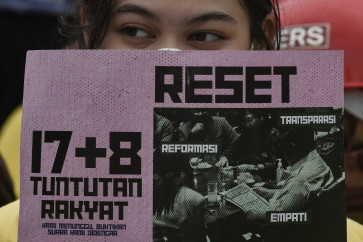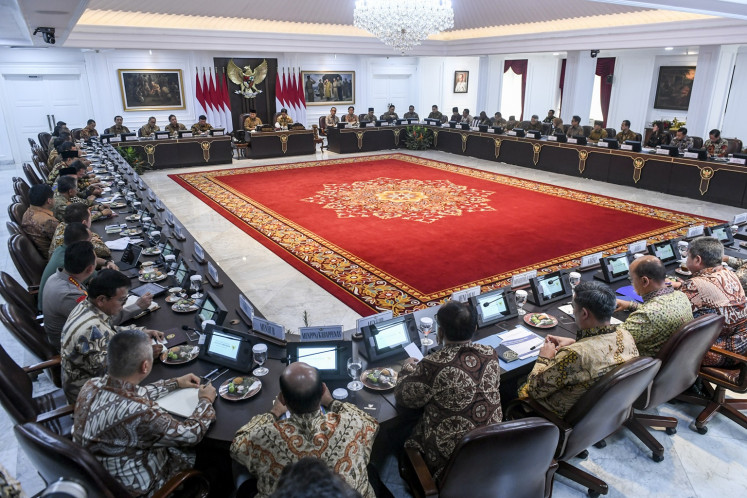Popular Reads
Top Results
Can't find what you're looking for?
View all search resultsPopular Reads
Top Results
Can't find what you're looking for?
View all search resultsEditorial: Abstention has its costs
The score read 14-0-1
Change text size
Gift Premium Articles
to Anyone
The score read 14-0-1. Fourteen countries voted for the resolution, none opposed it, and one abstained. Indonesia is the odd man out in the latest resolution at the United Nations Security Council about expanding sanctions against Iran over its nuclear policy.
Being the lone dissenter, Indoinesia's ambassador to the United Nations, Marty Natalegawa had his day in court, explaining the reason Jakarta begged to differ from the rest of the Council
His argument boils down to the need for this issue to be settled through negotiations, citing the latest report by the International Atomic Energy Agency which says Iran is cooperating and making progress.
But behind the articulation of Indonesia's argument and the eloquence of Ambassador Marty's delivery, this is not the real reason why Jakarta decided to abstain.
Around this time last year, Indonesia voted for the expansion of the resolution against Iran, citing that as a signatory to the non-proliferation treaty, Iran has the obligation to abide by the rules that other members also observed.
The real reason for Indonesia's abstention is that this time around, the government of President Susilo Bambang Yudhoyono could not stomach another battle on the home front.
Last year, the President came under a lot of criticism for supporting the resolution against Iran. The House of Representatives started a formal process to question the decision at the Security Council.
The government survived by making an argument that was just as persuasive and eloquent then. The President eventually won the battle. But with the election just a year away, presumably the former Army general decided it was best to avoid another battle, even if history was with him.
But a more compelling reason for Indonesia not to support the resolution is of course Yudhoyono's plan to travel to Tehran next week, reciprocating the high profile visit of President Mahmoud Ahmadinejad last year.
It would simply be inconceivable for the Indonesian leader to still go ahead with his trip to Iran if Indonesia had voted along for the resolution.
So domestic politics and his visit to Iran, rather than the argument put forward by Ambassador Marty in the Security Council, were the real reasons for Indonesia to take the risk and go it alone.
The vote had to be postponed on Friday as the sponsors, the United States and Britain, lobbied Indonesia, South Africa, Vietnam and Libya to support the resolution. By Monday, Indonesia was left alone.
But Indonesia's vote is irrelevant. We have no vetoing power, and the resolution was carried out without our support.
The bigger question we need to ask here is what has Indonesia gained or lost by abstaining in the latest vote at the Security Council.
By abstaining, you may think that you are playing safe. But while you probably don't win or lose friends, you actually risk alienating your friends.
The higher cost to pay however is our reputation on the international stage. To your friends, abstaining means you cannot make up your mind one way or another. You decline to support their cause but you also don't oppose it.
In short, you're a wimp.
You would gain a lot more respect if you voted one way or the other.
In fact, having made such a forceful and eloquent argument why more negotiation with Iran is preferred to expanding the sanctions, the logical conclusion should have been that Indonesia opposes the resolution.
While abstention is acceptable in the United Nations diplomacy, it is a last option. If you use this too often, you are essentially squandering votes and this therefore raises questions about your presence in the Security Council. By our count, this is not the first time that Indonesia has abstained since it joined the council as a non-permanent member for the 2007-2009 period.
When all is said and done, we believe the government has done its political calculations before deciding to abstain in the vote at the Security Council. We just hope the price it has to pay, including Indonesia's standing on the international stage, is well worth it.










